research
-
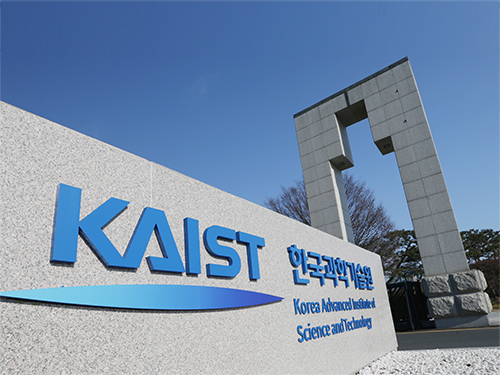 The Center for Anthropocene Studies (CAS) Opens
KAIST will start Anthropocene research, a convergence field of study, to address issues related to the commencement of human activities that have had scientific, industrial, and economic impacts on the Earth’s ecosystem. The National Research Foundation (NRF) of Korea endorsed the KAIST Center for Anthropocene Studies as its Convergence Research Center project.
Anthropocene refers to a new geological age in which various polluting materials that humans have made during the post-industrial revolution era have made a significant impact on the Earth and the lives of humankind. The studies expand the diverse socio-economic and environmental sectors for responding to climate change, natural disasters, ecological destruction, the polarization of the inequality and wealth, and many others.
The KAIST research group at the center, in collaboration with the Graduate School of Science and Technology Policy, the Graduate School of Culture Technology, the School of Humanities & Social Sciences, the Department of Industrial Design, the School of Electrical Engineering, the Satellite Technology Research Center (SaRTec), and the KAIST Initiative for Disaster Studies will conduct multidisciplinary research to address intriguing challenges with complex but creative approaches incorporating the fields of engineering, socioeconomics, and art.
The group will investigate topics such as▲ surface and marine changes to the Earth by applying satellite data ▲disaster prediction and governance system building through AI modeling ▲sustainable housing, transportation, and lifestyles ▲ engineering and artistic approaches for envisioning a new future for humankind and the Earth.
Professor Buhm Soon Park, who is in charge of the center, said, “This pioneering research work will inspire the re-creation of a new paradigm of convergence studies in science, engineering, humanities, and social science. We will contribute to making the world better by designing new technologies and social policies.
2018.06.05 View 12388
The Center for Anthropocene Studies (CAS) Opens
KAIST will start Anthropocene research, a convergence field of study, to address issues related to the commencement of human activities that have had scientific, industrial, and economic impacts on the Earth’s ecosystem. The National Research Foundation (NRF) of Korea endorsed the KAIST Center for Anthropocene Studies as its Convergence Research Center project.
Anthropocene refers to a new geological age in which various polluting materials that humans have made during the post-industrial revolution era have made a significant impact on the Earth and the lives of humankind. The studies expand the diverse socio-economic and environmental sectors for responding to climate change, natural disasters, ecological destruction, the polarization of the inequality and wealth, and many others.
The KAIST research group at the center, in collaboration with the Graduate School of Science and Technology Policy, the Graduate School of Culture Technology, the School of Humanities & Social Sciences, the Department of Industrial Design, the School of Electrical Engineering, the Satellite Technology Research Center (SaRTec), and the KAIST Initiative for Disaster Studies will conduct multidisciplinary research to address intriguing challenges with complex but creative approaches incorporating the fields of engineering, socioeconomics, and art.
The group will investigate topics such as▲ surface and marine changes to the Earth by applying satellite data ▲disaster prediction and governance system building through AI modeling ▲sustainable housing, transportation, and lifestyles ▲ engineering and artistic approaches for envisioning a new future for humankind and the Earth.
Professor Buhm Soon Park, who is in charge of the center, said, “This pioneering research work will inspire the re-creation of a new paradigm of convergence studies in science, engineering, humanities, and social science. We will contribute to making the world better by designing new technologies and social policies.
2018.06.05 View 12388 -
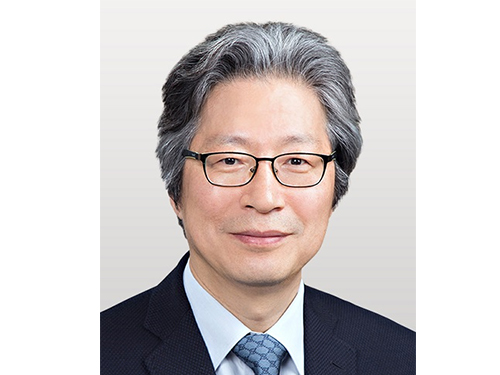 Professor Gou Young Koh, 2018 Laureate of Ho-Am Prize
Distinguished Professor Gou Young Koh from the Graduate School of Medical Science and Engineering was appointed a 2018 laureate in medicine of the Ho-Am Prize by the Ho-Am Foundation. Professor Koh is a renowned expert in the field of tumor angiogenesis by exploring the hidden nature of capillary and lymphatic vessels in human organs.
He was recognized for demonstrating the effective reduction of tumor progression and metastasis via tumor vessel normalization. This counterintuitive study result is regarded as a stepping stone for a drug discovery to prevent microvascular diseases.
Besides Professor Koh, Professor Hee Oh from Yale University (Science), Professor Nam-Gyu Park from Sungkyunkwan University (Engineering), Opera Singer Kwangchul Youn (The Arts) and Sister Carla Kang (Community Service) received awards.
The Ho-Am Prize is presented to individuals who have contributed to academics, the arts, and social development, or furthered the welfare of humanity, and commemorates the noble spirit of public service espoused by the late Chairman Byung-chull Lee, who used the pen name Ho-Am.
It was established in 1990 by Kun-Hee Lee, the chairman of Samsung. Awards have been presented to 143 individuals worth a total of 24.4 billion KRW.
2018.04.11 View 8688
Professor Gou Young Koh, 2018 Laureate of Ho-Am Prize
Distinguished Professor Gou Young Koh from the Graduate School of Medical Science and Engineering was appointed a 2018 laureate in medicine of the Ho-Am Prize by the Ho-Am Foundation. Professor Koh is a renowned expert in the field of tumor angiogenesis by exploring the hidden nature of capillary and lymphatic vessels in human organs.
He was recognized for demonstrating the effective reduction of tumor progression and metastasis via tumor vessel normalization. This counterintuitive study result is regarded as a stepping stone for a drug discovery to prevent microvascular diseases.
Besides Professor Koh, Professor Hee Oh from Yale University (Science), Professor Nam-Gyu Park from Sungkyunkwan University (Engineering), Opera Singer Kwangchul Youn (The Arts) and Sister Carla Kang (Community Service) received awards.
The Ho-Am Prize is presented to individuals who have contributed to academics, the arts, and social development, or furthered the welfare of humanity, and commemorates the noble spirit of public service espoused by the late Chairman Byung-chull Lee, who used the pen name Ho-Am.
It was established in 1990 by Kun-Hee Lee, the chairman of Samsung. Awards have been presented to 143 individuals worth a total of 24.4 billion KRW.
2018.04.11 View 8688 -
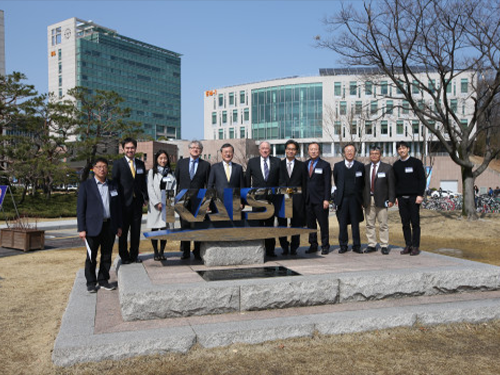 Nobel Laureates Brighten the Conversation at Global Leaders Forum
Two Nobel laureates who participated in the President’s Advisory Council joined the Global Leaders Forum as plenary speakers at KAIST on March 22. The forum highlighted the 25 events which were held during the Vision Week in celebration of the Vision 2031 Declaration Ceremony on March 20.
(President of KAIST Sung-Chul Shin, making welcoming remarks)
The Global Leaders Forum, titled “Scientific Discovery and Creativity,’ brought two prominent Nobel laureates in physics and chemistry. Dr. Klaus von Klitzing from the Max-Planck Institute for Solid State Research and Dr. Kurt Wüthrich from ETH Zürich inspired more than 300 audience members, including many young scholars, at Fusion Hall.
(Dr. Klaus von Klitzing from the Max-Planck Institute for Solid State Research)
Dr. Klitzing received the prize in 1985 in recognition of his discovery of the ‘integer quantum Hall effect.’ Meanwhile Dr. Wüthrich was awarded in 2002 for ‘"the development of Nuclear Magnetic Resonance methods for the determination of protein structures in solution."
Not only did they share their journey that led to the Nobel Prize, but also disclosed their personal stories that can relate to KAIST students as they pursue their scientific careers.
Many of the questions raised pertained to ‘creativity’ and ‘failure’: what is creativity and how to improve it and what is failure and how to deal with it. Dr. Klitzing replied, “If you want to go to a new direction, ask yourself inner question: what you really want to do.”
(From left: Dr. Klaus von Klitzing and Dr. Kurt Wüthrich from ETH Zürich)
Meanwhile, Dr. Wüthrich advised to set your goal first, before you start your research. “We tend to romanticize the creativity and it can be simulated. But it hardly does. It is important to know your goal first and set it appropriately.”
“Define failure as a process to learn something new, then you can comfortably move on,” he suggested in dealing with failure. “In many cases, the great achievement sometimes happens accidentally not intentionally. Maybe, you can see one success after 100 failures in the experiments. Nobody can predict the Nobel Prize quantitatively. Set the goal, and go to international conferences frequently if possible and evaluate where you are, compared with your international peers. Then, you can modify your goal and pursue what you want to do. Foremost, just enjoy your scientific work you are working with. That’s all. There’s no secret in the Nobel Prize.”
Since artificial intelligence is taking over people’s job, there’s also the question whether the concept of creativity should be modified due to technology development.
Regarding this question, Dr. von Klitzing made a strong point that the concept of creativity stays the same. He said that creativity is something new; in that sense, computers can never be creative because they use present, existing knowledge.
There was also a surprising moment. Dr. Wűthrich, who earned a bachelor’s degree in chemistry, physics, and mathematics, revealed to the audiences that his dream used to be a football player, not a scientist. He injured his foot, which prevented him from playing soccer, and that caused him to choose another career path.
Both laureates highlighted the importance of a positive attitude for their dreams and an open mindset for their colleagues and field of study.
Dr. von Klitzing pointed out that asking new questions can be the foundation of creativity. Hence, he urged students to be open minded and try to interact with one another.
Dr. Wűthrich commented that it is the job of professors to expand the view of students and guide younger generations. For young scientists, they should keep in mind that failure is something positive and that having an optimistic attitude is crucial.
(President of KAIST Sung-Chul Shin with the panelists and Dean of KAIST Academy Tae-Eog Lee)
(Interview of Dr. Kurt Wüthrich)
2018.03.27 View 4537
Nobel Laureates Brighten the Conversation at Global Leaders Forum
Two Nobel laureates who participated in the President’s Advisory Council joined the Global Leaders Forum as plenary speakers at KAIST on March 22. The forum highlighted the 25 events which were held during the Vision Week in celebration of the Vision 2031 Declaration Ceremony on March 20.
(President of KAIST Sung-Chul Shin, making welcoming remarks)
The Global Leaders Forum, titled “Scientific Discovery and Creativity,’ brought two prominent Nobel laureates in physics and chemistry. Dr. Klaus von Klitzing from the Max-Planck Institute for Solid State Research and Dr. Kurt Wüthrich from ETH Zürich inspired more than 300 audience members, including many young scholars, at Fusion Hall.
(Dr. Klaus von Klitzing from the Max-Planck Institute for Solid State Research)
Dr. Klitzing received the prize in 1985 in recognition of his discovery of the ‘integer quantum Hall effect.’ Meanwhile Dr. Wüthrich was awarded in 2002 for ‘"the development of Nuclear Magnetic Resonance methods for the determination of protein structures in solution."
Not only did they share their journey that led to the Nobel Prize, but also disclosed their personal stories that can relate to KAIST students as they pursue their scientific careers.
Many of the questions raised pertained to ‘creativity’ and ‘failure’: what is creativity and how to improve it and what is failure and how to deal with it. Dr. Klitzing replied, “If you want to go to a new direction, ask yourself inner question: what you really want to do.”
(From left: Dr. Klaus von Klitzing and Dr. Kurt Wüthrich from ETH Zürich)
Meanwhile, Dr. Wüthrich advised to set your goal first, before you start your research. “We tend to romanticize the creativity and it can be simulated. But it hardly does. It is important to know your goal first and set it appropriately.”
“Define failure as a process to learn something new, then you can comfortably move on,” he suggested in dealing with failure. “In many cases, the great achievement sometimes happens accidentally not intentionally. Maybe, you can see one success after 100 failures in the experiments. Nobody can predict the Nobel Prize quantitatively. Set the goal, and go to international conferences frequently if possible and evaluate where you are, compared with your international peers. Then, you can modify your goal and pursue what you want to do. Foremost, just enjoy your scientific work you are working with. That’s all. There’s no secret in the Nobel Prize.”
Since artificial intelligence is taking over people’s job, there’s also the question whether the concept of creativity should be modified due to technology development.
Regarding this question, Dr. von Klitzing made a strong point that the concept of creativity stays the same. He said that creativity is something new; in that sense, computers can never be creative because they use present, existing knowledge.
There was also a surprising moment. Dr. Wűthrich, who earned a bachelor’s degree in chemistry, physics, and mathematics, revealed to the audiences that his dream used to be a football player, not a scientist. He injured his foot, which prevented him from playing soccer, and that caused him to choose another career path.
Both laureates highlighted the importance of a positive attitude for their dreams and an open mindset for their colleagues and field of study.
Dr. von Klitzing pointed out that asking new questions can be the foundation of creativity. Hence, he urged students to be open minded and try to interact with one another.
Dr. Wűthrich commented that it is the job of professors to expand the view of students and guide younger generations. For young scientists, they should keep in mind that failure is something positive and that having an optimistic attitude is crucial.
(President of KAIST Sung-Chul Shin with the panelists and Dean of KAIST Academy Tae-Eog Lee)
(Interview of Dr. Kurt Wüthrich)
2018.03.27 View 4537 -
 Three Professors Named KAST Fellows
(Professor Dan Keun Sung at the center)
(Professor Y.H. Cho at the center)
(Professor K.H. Cho at the center)
The Korean Academy of Science and Technology (KAST) inducted three KAIST professors as fellows at the New Year’s ceremony held at KAST on January 12. They were among the 24 newly elected fellows of the most distinguished academy in Korea. The new fellows are Professor Dan Keun Sung of the School of Electrical Engineering, Professor Kwang-Hyun Cho of the Department of Bio and Brain Engineering, and Professor Yong-Hoon Cho of the Department of Physics.
Professor Sung was recognized for his lifetime academic achievements in fields related with network protocols and energy ICT. He also played a crucial role in launching the Korean satellites KITSAT-1,2,3 and the establishment of the Satellite Technology Research Center at KAIST.
Professor Y.H.Cho has been a pioneer in the field of low-dimensional semiconductor-powered quantum photonics that enables quantum optical research in solid state. He has been recognized as a renowned scholar in this field internationally.
Professor K.H.Cho has conducted original research that combines IT and BT in systems biology and has applied novel technologies of electronic modeling and computer simulation analysis for investigating complex life sciences. Professor Cho, who is in his 40s, is the youngest fellow among the newly inducted fellows.
2018.01.16 View 14615
Three Professors Named KAST Fellows
(Professor Dan Keun Sung at the center)
(Professor Y.H. Cho at the center)
(Professor K.H. Cho at the center)
The Korean Academy of Science and Technology (KAST) inducted three KAIST professors as fellows at the New Year’s ceremony held at KAST on January 12. They were among the 24 newly elected fellows of the most distinguished academy in Korea. The new fellows are Professor Dan Keun Sung of the School of Electrical Engineering, Professor Kwang-Hyun Cho of the Department of Bio and Brain Engineering, and Professor Yong-Hoon Cho of the Department of Physics.
Professor Sung was recognized for his lifetime academic achievements in fields related with network protocols and energy ICT. He also played a crucial role in launching the Korean satellites KITSAT-1,2,3 and the establishment of the Satellite Technology Research Center at KAIST.
Professor Y.H.Cho has been a pioneer in the field of low-dimensional semiconductor-powered quantum photonics that enables quantum optical research in solid state. He has been recognized as a renowned scholar in this field internationally.
Professor K.H.Cho has conducted original research that combines IT and BT in systems biology and has applied novel technologies of electronic modeling and computer simulation analysis for investigating complex life sciences. Professor Cho, who is in his 40s, is the youngest fellow among the newly inducted fellows.
2018.01.16 View 14615 -
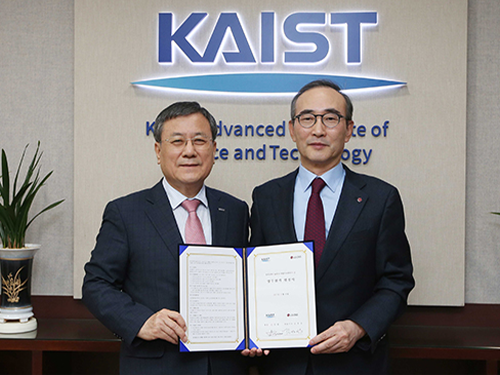 Strengthening Industry-Academia Cooperation with LG CNS
On November 20, KAIST signed an MoU with LG CNS for industry-academia partnership in education, research, and business in the fields of AI and Big Data. Rather than simply developing education programs or supporting industry-academia scholarships, both organizations agreed to carry out a joint research project on AI and Big Data that can be applied to practical business.
KAIST will collaborate with LG CNS in the fields of smart factories, customer analysis, and supply chain management analysis.
Not only will LG CNS offer internships to KAIST students, but it also will support professors and students who propose innovative startup ideas for AI and Big Data. Offering an industry-academia scholarship for graduate students is also being discussed. Together with LG CNS, KAIST will put its efforts into propose projects regarding AI and Big Data in the public sector.
Furthermore, KAIST and LG CNS will jointly explore and carry out industry-academia projects that could be practically used in business. Both will carry out the project vigorously through strong cooperation; for instance, LG CNS employees can be assigned to KAIST, if necessary. Also, LG CNS’s AI and Big Data platform, called DAP (Data Analytics & AI Platform) will be used as a data analysis tool during the project and the joint outcomes will be installed in DAP.
KAIST professors with expertise in AI deep learning have trained LG CNS employees since the Department of Industrial & Systems Engineering established ‘KAIST AI Academy’ in LG CNS last August.
“With KAIST, the best research-centered university in Korea, we will continue to lead in developing the field of AI and Big Data and provide innovative services that create value by connecting them to customer business,” Yong Shub Kim, the CEO of LG CNS, highlighted.
2017.11.22 View 11731
Strengthening Industry-Academia Cooperation with LG CNS
On November 20, KAIST signed an MoU with LG CNS for industry-academia partnership in education, research, and business in the fields of AI and Big Data. Rather than simply developing education programs or supporting industry-academia scholarships, both organizations agreed to carry out a joint research project on AI and Big Data that can be applied to practical business.
KAIST will collaborate with LG CNS in the fields of smart factories, customer analysis, and supply chain management analysis.
Not only will LG CNS offer internships to KAIST students, but it also will support professors and students who propose innovative startup ideas for AI and Big Data. Offering an industry-academia scholarship for graduate students is also being discussed. Together with LG CNS, KAIST will put its efforts into propose projects regarding AI and Big Data in the public sector.
Furthermore, KAIST and LG CNS will jointly explore and carry out industry-academia projects that could be practically used in business. Both will carry out the project vigorously through strong cooperation; for instance, LG CNS employees can be assigned to KAIST, if necessary. Also, LG CNS’s AI and Big Data platform, called DAP (Data Analytics & AI Platform) will be used as a data analysis tool during the project and the joint outcomes will be installed in DAP.
KAIST professors with expertise in AI deep learning have trained LG CNS employees since the Department of Industrial & Systems Engineering established ‘KAIST AI Academy’ in LG CNS last August.
“With KAIST, the best research-centered university in Korea, we will continue to lead in developing the field of AI and Big Data and provide innovative services that create value by connecting them to customer business,” Yong Shub Kim, the CEO of LG CNS, highlighted.
2017.11.22 View 11731 -
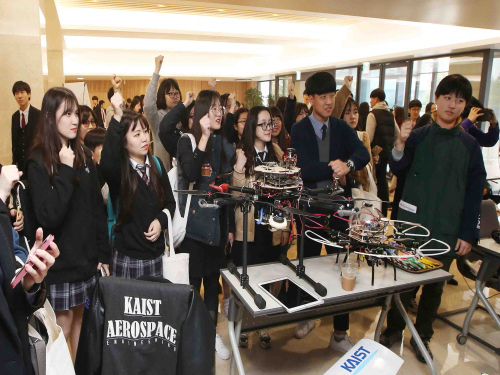 KAST Opened the Campus to the Public
KAIST hosted OPEN KAIST 2017 on the main campus from November 2 to 3, 2017. OPEN KAIST is a science and cultural event designed for students and the general public to experience and take a glance at research labs.
More than 10,000 visitors came to KAIST this year. Groups of families and students came to KAIST to experience various programs related to science.
Twenty departments, including Mechanical Engineering, Aerospace Engineering, the Graduate School of Cultural Technology, and Materials Science and Engineering participated in the event, along with three research centers and the Public Relations Office.
The event was composed of a total of 70 programs in four sections: lab tour, research performance exhibition, department introduction, and special lectures.
The kick off activity for the event was a trial game of the AI World Cup 2017 which will be hosted by KAIST in December 2017. Many people also visited the mobile health care showroom where they could experience what a future smart home and hospital would look like. It was also interesting to visit a futuristic living space for one-person households that provides virtual reality services.
KAIST hopes that the event offers an opportunity for children and students to get to know about science better. Professor Jong-Hwan Kim, the Dean of the College of Engineering at KAIST said, “OPEN KAIST is the one and only opportunity to visit and experience our research labs. KAIST will make every effort to take a step closer to the public by focusing on research that contributes to human society.”
2017.11.06 View 7466
KAST Opened the Campus to the Public
KAIST hosted OPEN KAIST 2017 on the main campus from November 2 to 3, 2017. OPEN KAIST is a science and cultural event designed for students and the general public to experience and take a glance at research labs.
More than 10,000 visitors came to KAIST this year. Groups of families and students came to KAIST to experience various programs related to science.
Twenty departments, including Mechanical Engineering, Aerospace Engineering, the Graduate School of Cultural Technology, and Materials Science and Engineering participated in the event, along with three research centers and the Public Relations Office.
The event was composed of a total of 70 programs in four sections: lab tour, research performance exhibition, department introduction, and special lectures.
The kick off activity for the event was a trial game of the AI World Cup 2017 which will be hosted by KAIST in December 2017. Many people also visited the mobile health care showroom where they could experience what a future smart home and hospital would look like. It was also interesting to visit a futuristic living space for one-person households that provides virtual reality services.
KAIST hopes that the event offers an opportunity for children and students to get to know about science better. Professor Jong-Hwan Kim, the Dean of the College of Engineering at KAIST said, “OPEN KAIST is the one and only opportunity to visit and experience our research labs. KAIST will make every effort to take a step closer to the public by focusing on research that contributes to human society.”
2017.11.06 View 7466 -
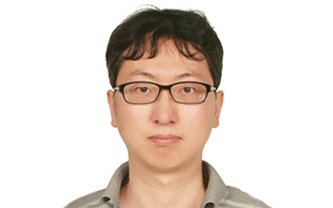 Professor Lee Recognized by the KMS as Best Paper Awardee
Professor Ji Oon Lee of the Department of Mathematical Sciences was selected as the 2017 Best Paper Awardee by the Korean Mathematical Society. The award will be presented during the KMS spring meeting on April 29. Dr. Lee is being honored for proving a necessary and sufficient condition for the Tracy-Wisdom law of Wigner matrices. In a paper titled ‘A Necessary and Sufficient Condition for Edge Universality of Wigner Matrices,’ he proposed a solution for one of the many unanswered problems in the field of random matrix theory that have existed for decades. The paper, co-authored with Professor Jun Yin at the University of Wisconsin – Madison, was published in the Duke Mathematical Journal in 2014. Professor Lee joined KAIST in 2010 after finishing his Ph.D. at Harvard University. He was named a ‘POSCI Science Fellow’ and received the ‘Young Scientist Award’ from the KMS in 2014.
2017.04.27 View 9686
Professor Lee Recognized by the KMS as Best Paper Awardee
Professor Ji Oon Lee of the Department of Mathematical Sciences was selected as the 2017 Best Paper Awardee by the Korean Mathematical Society. The award will be presented during the KMS spring meeting on April 29. Dr. Lee is being honored for proving a necessary and sufficient condition for the Tracy-Wisdom law of Wigner matrices. In a paper titled ‘A Necessary and Sufficient Condition for Edge Universality of Wigner Matrices,’ he proposed a solution for one of the many unanswered problems in the field of random matrix theory that have existed for decades. The paper, co-authored with Professor Jun Yin at the University of Wisconsin – Madison, was published in the Duke Mathematical Journal in 2014. Professor Lee joined KAIST in 2010 after finishing his Ph.D. at Harvard University. He was named a ‘POSCI Science Fellow’ and received the ‘Young Scientist Award’ from the KMS in 2014.
2017.04.27 View 9686 -
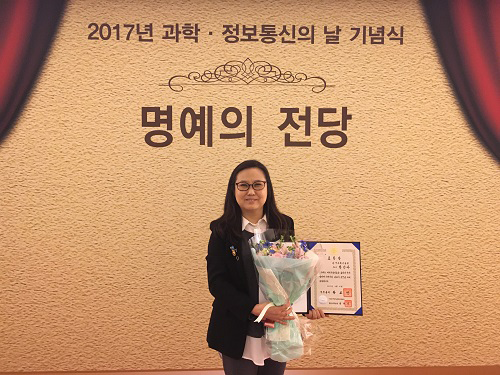 Professor Jinah Park Received the Prime Minister's Award
Professor Jinah Park of the School of Computing received the Prime Minister’s Citation Ribbon on April 21 at a ceremony celebrating the Day of Science and ICT. The awardee was selected by the Ministry of Science, ICT and Future Planning and Korea Communications Commission.
Professor Park was recognized for her convergence R&D of a VR simulator for dental treatment with haptic feedback, in addition to her research on understanding 3D interaction behavior in VR environments. Her major academic contributions are in the field of medical imaging, where she developed a computational technique to analyze cardiac motion from tagging data.
Professor Park said she was very pleased to see her twenty-plus years of research on ways to converge computing into medical areas finally bear fruit. She also thanked her colleagues and students in her Computer Graphics and CGV Research Lab for working together to make this achievement possible.
2017.04.26 View 10035
Professor Jinah Park Received the Prime Minister's Award
Professor Jinah Park of the School of Computing received the Prime Minister’s Citation Ribbon on April 21 at a ceremony celebrating the Day of Science and ICT. The awardee was selected by the Ministry of Science, ICT and Future Planning and Korea Communications Commission.
Professor Park was recognized for her convergence R&D of a VR simulator for dental treatment with haptic feedback, in addition to her research on understanding 3D interaction behavior in VR environments. Her major academic contributions are in the field of medical imaging, where she developed a computational technique to analyze cardiac motion from tagging data.
Professor Park said she was very pleased to see her twenty-plus years of research on ways to converge computing into medical areas finally bear fruit. She also thanked her colleagues and students in her Computer Graphics and CGV Research Lab for working together to make this achievement possible.
2017.04.26 View 10035 -
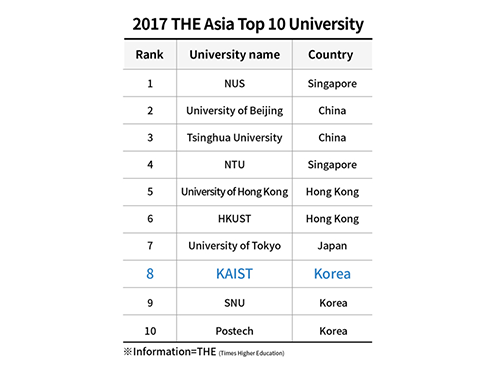 KAIST Ranked Top in Korea, 8th in Asia in 2017 THE Asia Rankings
KAIST ranked top among Korean universities and 8th in Asia according to the 2017 THE (Times Higher Education) Asia University Rankings published on March 16. This is the first time that KAIST took the top position in Korea in the THE rankings.
The 2017 THE Asia University Rankings rank the top 300 universities in Asia, employing five performance indicators: teaching, research, citations, industry income, and international outlook.
KAIST jumped two spots from last year to rank first in Korea with outstanding improvements in teaching and research this year, while earning the perfect score for industry income for the second consecutive year.
2017.03.17 View 3821
KAIST Ranked Top in Korea, 8th in Asia in 2017 THE Asia Rankings
KAIST ranked top among Korean universities and 8th in Asia according to the 2017 THE (Times Higher Education) Asia University Rankings published on March 16. This is the first time that KAIST took the top position in Korea in the THE rankings.
The 2017 THE Asia University Rankings rank the top 300 universities in Asia, employing five performance indicators: teaching, research, citations, industry income, and international outlook.
KAIST jumped two spots from last year to rank first in Korea with outstanding improvements in teaching and research this year, while earning the perfect score for industry income for the second consecutive year.
2017.03.17 View 3821 -
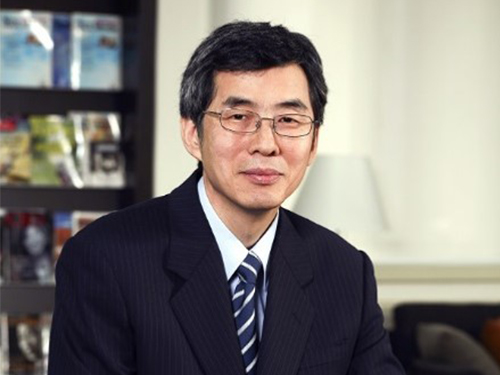 Professor Hahn Named Sangnam Business Researcher Awardee
Professor Minhi Hahn of the School of Management Engineering at the KAIST College of Business has been named the winner of the 22nd Sangnam Business Researcher Award. The Sangnam Award is the highest distinction made by the Korean Academic Society of Business Administration to recognize an outstanding scholar in the field of business & management for that year.
His research focuses on how marketing communication impacts customer choices and their satisfaction. Professor Hahn has served on the faculty of the College of Business since 1989, and has supervised more than 21 Ph.D.s and 203 master’s students while publishing more than 51 papers in domestic and foreign journals. He served as dean of the KAIST College of Business, president of the Korean Marketing Association, and president of the Korean Society of Consumer Studies. Currently Professor Hahn is a board member on the strategic committee of the College of Management at National Sun Yat-sen University in Taiwan.
Professor Hahn said, “I am pleased to receive this award on behalf of the people who are working for the development of Korean business administration. I will do my utmost to support younger scholars to continue their meaningful research." The award ceremony will take place at the Plaza Hotel in Seoul on February 23.
2017.02.19 View 6833
Professor Hahn Named Sangnam Business Researcher Awardee
Professor Minhi Hahn of the School of Management Engineering at the KAIST College of Business has been named the winner of the 22nd Sangnam Business Researcher Award. The Sangnam Award is the highest distinction made by the Korean Academic Society of Business Administration to recognize an outstanding scholar in the field of business & management for that year.
His research focuses on how marketing communication impacts customer choices and their satisfaction. Professor Hahn has served on the faculty of the College of Business since 1989, and has supervised more than 21 Ph.D.s and 203 master’s students while publishing more than 51 papers in domestic and foreign journals. He served as dean of the KAIST College of Business, president of the Korean Marketing Association, and president of the Korean Society of Consumer Studies. Currently Professor Hahn is a board member on the strategic committee of the College of Management at National Sun Yat-sen University in Taiwan.
Professor Hahn said, “I am pleased to receive this award on behalf of the people who are working for the development of Korean business administration. I will do my utmost to support younger scholars to continue their meaningful research." The award ceremony will take place at the Plaza Hotel in Seoul on February 23.
2017.02.19 View 6833 -
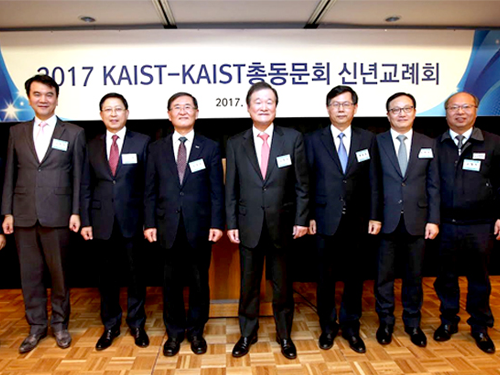 KAIST Alumni of the Year
(From left Chul-Hwan Kim, president and CEO of Orange Power, Hooshik Kim, president & CEO of Vieworks, Chilhee Chung, presient of Samsung Advanced Institute of Technology, KAIST President Sung-Mo Kang, KAIST Alumni Association President Jung-Sik Ko, Won-Pil Baek, senior vice president for R&D program at Korea Atomic Energy Research Insitute, Hyonho Jung, CEO of Medytox, Jaehwa Kim on behalf of Han-Oh Park, president & CEO of Bioneer Corporation)
The KAIST Alumni Association presented the Alumni of the Year award to six of its most accomplished alumni at the New Year dinner held at the Lotte Hotel in Seoul on January 14.
KAIST alumni community, which numbers over 500,000, has made a significant impact around the globe in science and technology, industry, education, and the public sector. Each year, the KAIST Alumni Association honors individuals who have made a significant contribution with outstanding leadership through the Alumni of the Year awards.
KAIST Alumni Association President Jung-Sik Ko awarded the recipients at the dinner. About 200 alumni, faculty, and students, including KAIST President Sung-Mo Kang, joined the celebration.
The 2016 awardees are Dr. Chilhee Chung, president of Samsung Advanced Institute of Technology(SAIT); Dr.Won-Pil Baek, senior vice president for R&D program at Korea Atomic Energy Research Institute(KAERI); Dr.Han-Oh Park, president & CEO of Bioneer Corporation; Dr.Hyonho Jung, CEO of Medytox; Hooshik Kim, president & CEO of Vieworks; and Dr.Chul-Hwan Kim, president & CEO of Orange Power.
Dr. Chung of SAIT (MS in physics ’79) played a leading role in developing top-notch system semiconductors and memory device technology while serving as president of the Samsung Electronic Semiconductor R&D Center. He has focused on the development of cutting-edge future technology, the Quantum Dot, by incorporating eco-friendly materials with the highest efficiency and color purity which is cadmium-free.
Working at KAERI since 2001, Dr. Baek (Ph.D. in nuclear and quantum engineering ’87) has made contributions to help Korea emerge as a nuclear technology powerhouse. He played a critical role in developing and facilitating a global nuclear safety verification facility dubbed ‘ATLAS.’ Such nuclear technological prowess led the Korean government to advance into the foreign markets, such as exporting nuclear power plants to United Arab Emirates.
The CEO of Bioneer, Dr. Park (Ph.D. in chemistry ’87) started a bio-venture in Korea. His company has developed hundreds of reagents, diagnostic kits, and advanced equipment for gene research over two decades. Bioneer has paved the way for establishing a world-class level of infrastructure in genomic technology. By developing the innovative technology "SAMiRNA ™ (Self-Assembled-Micelle-inhibitory-RNA)" that overcomes the problems in drug development, Bioneer presented a new solution for the treatment of incurable diseases. In collaboration with global pharmaceutical companies and research groups, Dr. Park has successfully led joint development in the licensing of new therapeutic medicine candidates for various incurable diseases.
Dr. Jung (Ph.D. in biological sciences ’88) founded the bio-pharmaceutical company Medytox in 2000. Medytox is the first company in Korea that commercialized botulinum toxin formulation. Medytox developed the non-animal liquid botulinum toxin formulation for the first time in the world. It successfully localized botulinum preparation that can treat various neurological diseases. Medytox’s new toxin formulation resulted in improving public health care as well as relieving the heavy dependence on importing bio-pharmaceutical products.
As the CEO of Vieworks, Kim (MS in physics ’95) succeeded in commercializing of digital X-ray. Especially, it is leading the design of optical and image systems that affect the quality of digital X-ray image. Kim’s company established related technology base, contributing to human health promotion and national industrial development.
President Kim of Orange Power (Ph.D. in chemical and biomolecular engineering ’93) is also the founder of the KITE Entrepreneurship Foundation. He launched Biogenix Co., Ltd. and Image and Materials Co. in 2005. In order to nurture an entrepreneurship and start-ups eco-system, he invested 10 billion KRW from the proceeds of the sale of one of his start-ups. In addition, he started Orange Power Co., Ltd. in 2012 to solve the secondary battery heat problem and established a global partnership with Hydro Quebec in Canada, Nexion in UK, Volkswagen of Germany, and Tesla of the US.
2017.01.16 View 12357
KAIST Alumni of the Year
(From left Chul-Hwan Kim, president and CEO of Orange Power, Hooshik Kim, president & CEO of Vieworks, Chilhee Chung, presient of Samsung Advanced Institute of Technology, KAIST President Sung-Mo Kang, KAIST Alumni Association President Jung-Sik Ko, Won-Pil Baek, senior vice president for R&D program at Korea Atomic Energy Research Insitute, Hyonho Jung, CEO of Medytox, Jaehwa Kim on behalf of Han-Oh Park, president & CEO of Bioneer Corporation)
The KAIST Alumni Association presented the Alumni of the Year award to six of its most accomplished alumni at the New Year dinner held at the Lotte Hotel in Seoul on January 14.
KAIST alumni community, which numbers over 500,000, has made a significant impact around the globe in science and technology, industry, education, and the public sector. Each year, the KAIST Alumni Association honors individuals who have made a significant contribution with outstanding leadership through the Alumni of the Year awards.
KAIST Alumni Association President Jung-Sik Ko awarded the recipients at the dinner. About 200 alumni, faculty, and students, including KAIST President Sung-Mo Kang, joined the celebration.
The 2016 awardees are Dr. Chilhee Chung, president of Samsung Advanced Institute of Technology(SAIT); Dr.Won-Pil Baek, senior vice president for R&D program at Korea Atomic Energy Research Institute(KAERI); Dr.Han-Oh Park, president & CEO of Bioneer Corporation; Dr.Hyonho Jung, CEO of Medytox; Hooshik Kim, president & CEO of Vieworks; and Dr.Chul-Hwan Kim, president & CEO of Orange Power.
Dr. Chung of SAIT (MS in physics ’79) played a leading role in developing top-notch system semiconductors and memory device technology while serving as president of the Samsung Electronic Semiconductor R&D Center. He has focused on the development of cutting-edge future technology, the Quantum Dot, by incorporating eco-friendly materials with the highest efficiency and color purity which is cadmium-free.
Working at KAERI since 2001, Dr. Baek (Ph.D. in nuclear and quantum engineering ’87) has made contributions to help Korea emerge as a nuclear technology powerhouse. He played a critical role in developing and facilitating a global nuclear safety verification facility dubbed ‘ATLAS.’ Such nuclear technological prowess led the Korean government to advance into the foreign markets, such as exporting nuclear power plants to United Arab Emirates.
The CEO of Bioneer, Dr. Park (Ph.D. in chemistry ’87) started a bio-venture in Korea. His company has developed hundreds of reagents, diagnostic kits, and advanced equipment for gene research over two decades. Bioneer has paved the way for establishing a world-class level of infrastructure in genomic technology. By developing the innovative technology "SAMiRNA ™ (Self-Assembled-Micelle-inhibitory-RNA)" that overcomes the problems in drug development, Bioneer presented a new solution for the treatment of incurable diseases. In collaboration with global pharmaceutical companies and research groups, Dr. Park has successfully led joint development in the licensing of new therapeutic medicine candidates for various incurable diseases.
Dr. Jung (Ph.D. in biological sciences ’88) founded the bio-pharmaceutical company Medytox in 2000. Medytox is the first company in Korea that commercialized botulinum toxin formulation. Medytox developed the non-animal liquid botulinum toxin formulation for the first time in the world. It successfully localized botulinum preparation that can treat various neurological diseases. Medytox’s new toxin formulation resulted in improving public health care as well as relieving the heavy dependence on importing bio-pharmaceutical products.
As the CEO of Vieworks, Kim (MS in physics ’95) succeeded in commercializing of digital X-ray. Especially, it is leading the design of optical and image systems that affect the quality of digital X-ray image. Kim’s company established related technology base, contributing to human health promotion and national industrial development.
President Kim of Orange Power (Ph.D. in chemical and biomolecular engineering ’93) is also the founder of the KITE Entrepreneurship Foundation. He launched Biogenix Co., Ltd. and Image and Materials Co. in 2005. In order to nurture an entrepreneurship and start-ups eco-system, he invested 10 billion KRW from the proceeds of the sale of one of his start-ups. In addition, he started Orange Power Co., Ltd. in 2012 to solve the secondary battery heat problem and established a global partnership with Hydro Quebec in Canada, Nexion in UK, Volkswagen of Germany, and Tesla of the US.
2017.01.16 View 12357 -
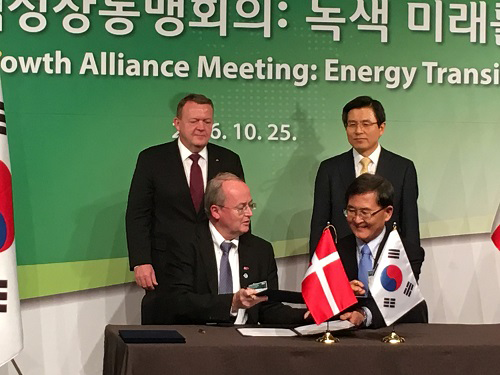 MOU between KAIST and DTU Signed
KAIST and the Technical University of Denmark (DTU) signed a memorandum of understanding (MOU) to cooperate in the areas of startup, student exchange, and joint research on October 25, 2016 at the Embassy of Denmark in Seoul, Korea. Under the agreement, KAIST and DTU will exchange students and researchers through startup programs and continue to collaborating in education and research.
The MOU was facilitated during the Green Growth Alliance Meeting and Energy Seminar hosted by the Danish embassy, in which Danish Prime Minister Lars Løkke Rasmussen participated.
President Steve Kang of KAIST, who fostered the agreement, said,
“DTU has been one of our strategic partners in Europe. We have been working closely with them on academic exchanges and research collaborations, but now with the expansion of our cooperation into entrepreneurship, we will create momentum to spur startups in both schools. To support such activities, we will use KAIST’s experiences acquired from operating the K-School, an entrepreneurship graduate school, and the Institute of KAIST Entrepreneurship. DTU will also share their knowledge on startup programs including SkyLab and StartDTU. I believe this will become another successful alliance between the two universities.”
As of October 2016, KAIST has made 18 agreements with DTU, exchanging 120 students in the past three years and implementing various joint seminars and conferences for academic and research exchanges.
Established in 1829, DTU has been a leading science and technology university in Denmark. It ranked 109 in the QS World University Rankings 2016 and 46th in its subject rankings in engineering and technology.
In the picture below, President Steve Kang of KAIST (right) and Senior Vice President Martin P. Bendsøe of the Technical University of Denmark (left) are signing an agreement for academic and research cooperation.
2016.10.27 View 8214
MOU between KAIST and DTU Signed
KAIST and the Technical University of Denmark (DTU) signed a memorandum of understanding (MOU) to cooperate in the areas of startup, student exchange, and joint research on October 25, 2016 at the Embassy of Denmark in Seoul, Korea. Under the agreement, KAIST and DTU will exchange students and researchers through startup programs and continue to collaborating in education and research.
The MOU was facilitated during the Green Growth Alliance Meeting and Energy Seminar hosted by the Danish embassy, in which Danish Prime Minister Lars Løkke Rasmussen participated.
President Steve Kang of KAIST, who fostered the agreement, said,
“DTU has been one of our strategic partners in Europe. We have been working closely with them on academic exchanges and research collaborations, but now with the expansion of our cooperation into entrepreneurship, we will create momentum to spur startups in both schools. To support such activities, we will use KAIST’s experiences acquired from operating the K-School, an entrepreneurship graduate school, and the Institute of KAIST Entrepreneurship. DTU will also share their knowledge on startup programs including SkyLab and StartDTU. I believe this will become another successful alliance between the two universities.”
As of October 2016, KAIST has made 18 agreements with DTU, exchanging 120 students in the past three years and implementing various joint seminars and conferences for academic and research exchanges.
Established in 1829, DTU has been a leading science and technology university in Denmark. It ranked 109 in the QS World University Rankings 2016 and 46th in its subject rankings in engineering and technology.
In the picture below, President Steve Kang of KAIST (right) and Senior Vice President Martin P. Bendsøe of the Technical University of Denmark (left) are signing an agreement for academic and research cooperation.
2016.10.27 View 8214